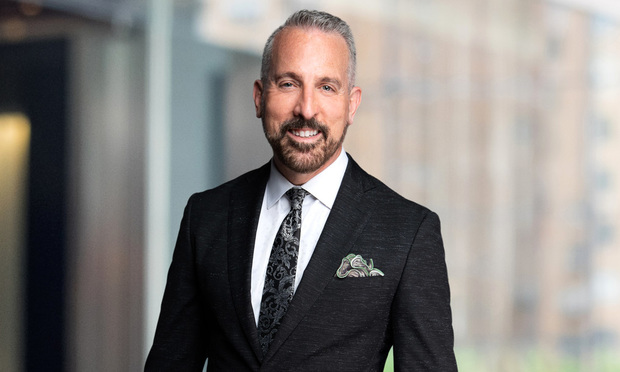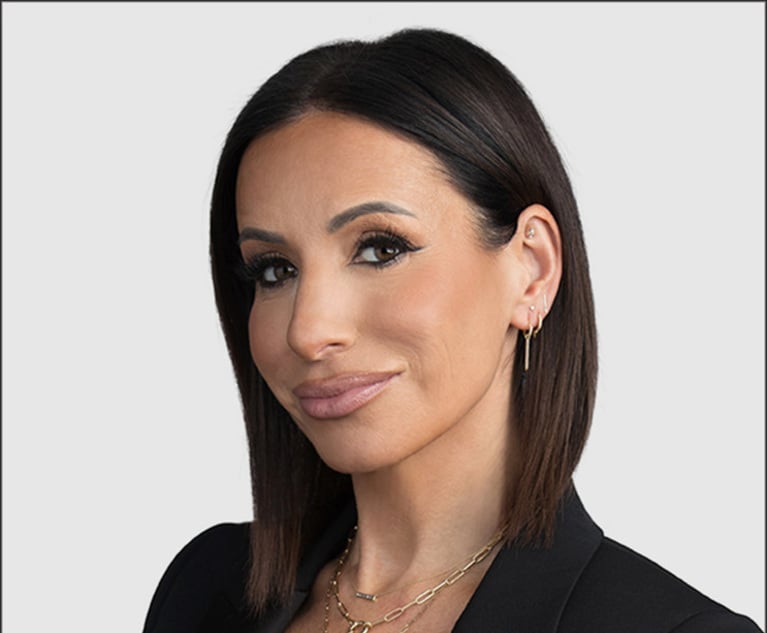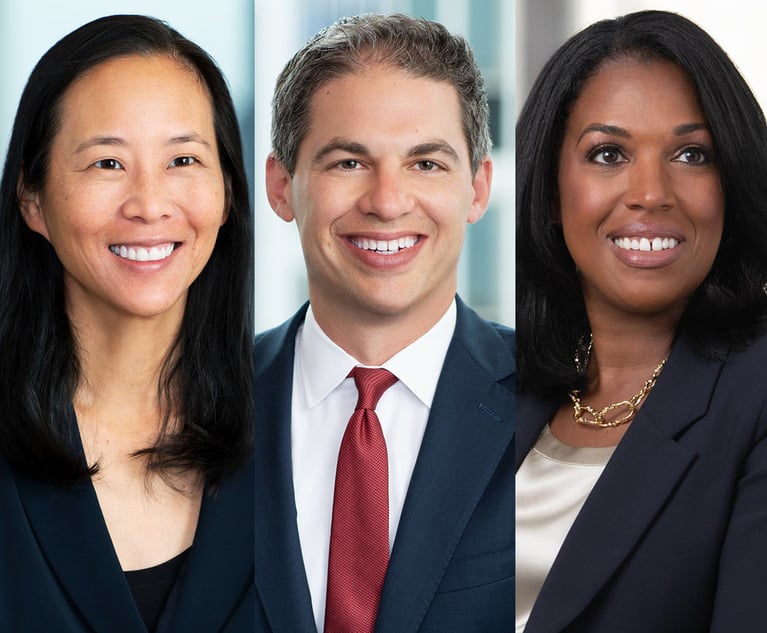LGBTQ Businesses and Lawyers the Focus of New Partnership at Porter Wright
Under a new initiative, Porter Wright will seek out co-counsel relationships for client matters with solo practitioners and small law firms that have been certified as an LGBTQ-owned business.
August 20, 2019 at 06:23 PM
4 minute read
 Ron Hicks, partner with Porter Wright Morris & Arthur.
Ron Hicks, partner with Porter Wright Morris & Arthur.
Shortly after lawyer Ron Hicks, at age 39, came out as gay to his friends, family members and employers, he began to center his law practice on the LGBTQ business community. Hicks said he found that he could more easily relate to LGBTQ business owners to provide legal services and help their businesses thrive.
“When I decided to come out, I thought it was important for [LGBTQ] business owners to know that I’m out and that I’ll talk to them because I had a similar story to them,” said Hicks, a Pittsburgh-based lawyer now in his 50s.
Hicks is hoping to expand business opportunities for both LGBTQ-business owners and lawyers through a new corporate partnership between his firm, Porter Wright Morris & Arthur, and the National LGBT Chamber of Commerce (NGLCC).
Under the partnership, the Columbus, Ohio-based Am Law 200 firm will seek out co-counsel relationships for client matters with solo practitioners and small law firms that have been certified as an LGBTQ-owned business, Hicks said.
“[The partnership will] allow firms like Porter Wright to partner with other types of minority law firms to work together to provide a great quality product to in-house general counsel,” he said.
In turn, Hicks said the Porter Wright and NGLCC partnership will allow LGBTQ-certified business owners affiliated with NGLCC to diversify their list of legal service providers.
The NGLCC, the only organization certifying LGBTQ-owned businesses, is a nonprofit group dedicated to expanding economic opportunities and advancement for people in the LGBTQ business community.
LGBTQ-owned businesses contribute an estimated $1.7 trillion to the U.S. economy, Porter Wright noted.
In a statement last week, Justin Nelson, NGLCC’s co-founder and president, said Porter Wright is serving as a role model for other law firms. “Partnering with the NGLCC is a logical step for many law firms that seek to advance their diversity values while also attracting and maintaining Fortune 1000 clients by mirroring their inclusion practices, including supplier diversity,” Nelson said.
Porter Wright will join more than 200 corporate partners working with the NGLCC, including Verizon, Delta Airlines, Apple and other companies that have spent hundreds of millions of dollars throughout their supply chains doing business with the organization’s certified LGBTQ-owned companies, according to NGLCC.
Hicks has been involved with NGLCC more than half a decade, and he currently serves on the organization’s National Legal Industry counsel and its Supplier Certification Committee. Hicks, who joined Porter Wright in July, previously spent 32 years at Pittsburgh boutique Meyer, Unkovic & Scott.
When he began his law career in the 1990s, and even after he came out, he did not want to be defined by his sexuality; just as a good attorney. Now, he said he realizes the importance of visibility.
In a state without legal business protections for members of the LGBTQ community, Hicks said business owners in Pennsylvania were less likely to consult attorneys or accountants because they didn’t want to be judged.
In the last 15 years, the commercial litigator started focusing on specifically representing LGBTQ business owners.
“It’s extremely important that people understand—I’m a gay lawyer,” he said. “I tell people all the time. It’s important for the younger generation that they have role models out there.”
Hicks said Porter Wright’s partnership with NGLCC is one of the ways in which his firm has shown its commitment to supporting diversity and inclusion. He noted the firm’s participation in the Mansfield Rule, which focuses on hiring and retaining women, lawyers of color, lawyers with disabilities and LGBTQ lawyers, as well as placing them in leadership positions and in line for promotions.
“There were a number of things in place that demonstrated [Porter Wright] had a commitment to deepen my practice as an LGBTQ attorney,” he said.
Last week, Hicks was at the NGLCC International Business and Leadership Conference in Tampa, Florida, where he was inspired with this advice: be who you are, and use that to your advantage.
“Don’t hide your differences,” he said. “Celebrate them, find a way to use them.”
This content has been archived. It is available through our partners, LexisNexis® and Bloomberg Law.
To view this content, please continue to their sites.
Not a Lexis Subscriber?
Subscribe Now
Not a Bloomberg Law Subscriber?
Subscribe Now
NOT FOR REPRINT
© 2025 ALM Global, LLC, All Rights Reserved. Request academic re-use from www.copyright.com. All other uses, submit a request to [email protected]. For more information visit Asset & Logo Licensing.
You Might Like
View All


Law Firms Close Southern California Offices Amid Devastating Wildfires

Trending Stories
Who Got The Work
Michael G. Bongiorno, Andrew Scott Dulberg and Elizabeth E. Driscoll from Wilmer Cutler Pickering Hale and Dorr have stepped in to represent Symbotic Inc., an A.I.-enabled technology platform that focuses on increasing supply chain efficiency, and other defendants in a pending shareholder derivative lawsuit. The case, filed Oct. 2 in Massachusetts District Court by the Brown Law Firm on behalf of Stephen Austen, accuses certain officers and directors of misleading investors in regard to Symbotic's potential for margin growth by failing to disclose that the company was not equipped to timely deploy its systems or manage expenses through project delays. The case, assigned to U.S. District Judge Nathaniel M. Gorton, is 1:24-cv-12522, Austen v. Cohen et al.
Who Got The Work
Edmund Polubinski and Marie Killmond of Davis Polk & Wardwell have entered appearances for data platform software development company MongoDB and other defendants in a pending shareholder derivative lawsuit. The action, filed Oct. 7 in New York Southern District Court by the Brown Law Firm, accuses the company's directors and/or officers of falsely expressing confidence in the company’s restructuring of its sales incentive plan and downplaying the severity of decreases in its upfront commitments. The case is 1:24-cv-07594, Roy v. Ittycheria et al.
Who Got The Work
Amy O. Bruchs and Kurt F. Ellison of Michael Best & Friedrich have entered appearances for Epic Systems Corp. in a pending employment discrimination lawsuit. The suit was filed Sept. 7 in Wisconsin Western District Court by Levine Eisberner LLC and Siri & Glimstad on behalf of a project manager who claims that he was wrongfully terminated after applying for a religious exemption to the defendant's COVID-19 vaccine mandate. The case, assigned to U.S. Magistrate Judge Anita Marie Boor, is 3:24-cv-00630, Secker, Nathan v. Epic Systems Corporation.
Who Got The Work
David X. Sullivan, Thomas J. Finn and Gregory A. Hall from McCarter & English have entered appearances for Sunrun Installation Services in a pending civil rights lawsuit. The complaint was filed Sept. 4 in Connecticut District Court by attorney Robert M. Berke on behalf of former employee George Edward Steins, who was arrested and charged with employing an unregistered home improvement salesperson. The complaint alleges that had Sunrun informed the Connecticut Department of Consumer Protection that the plaintiff's employment had ended in 2017 and that he no longer held Sunrun's home improvement contractor license, he would not have been hit with charges, which were dismissed in May 2024. The case, assigned to U.S. District Judge Jeffrey A. Meyer, is 3:24-cv-01423, Steins v. Sunrun, Inc. et al.
Who Got The Work
Greenberg Traurig shareholder Joshua L. Raskin has entered an appearance for boohoo.com UK Ltd. in a pending patent infringement lawsuit. The suit, filed Sept. 3 in Texas Eastern District Court by Rozier Hardt McDonough on behalf of Alto Dynamics, asserts five patents related to an online shopping platform. The case, assigned to U.S. District Judge Rodney Gilstrap, is 2:24-cv-00719, Alto Dynamics, LLC v. boohoo.com UK Limited.
Featured Firms
Law Offices of Gary Martin Hays & Associates, P.C.
(470) 294-1674
Law Offices of Mark E. Salomone
(857) 444-6468
Smith & Hassler
(713) 739-1250










